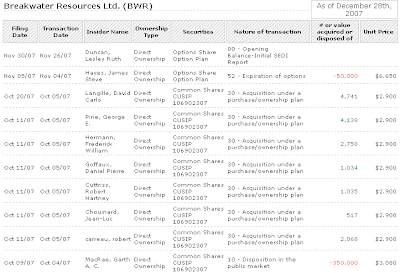skip to main |
skip to sidebar

Investment Strategies Ai Driven
Mission

- Treasure Picks
- This blog is posted to share under the provisions of "Fair dealing" offers some exceptions to the Copyright Act's general prohibition on copying. Fair dealing allows limited and non-commercial copying for the purposes of research or private study, criticism, review, and news reporting. Be sure to click each picture to make them bigger.
Crypto Currency Road To Riches Or Poverty?
The Motley Fool Investment Guide
Follow Us On Twitter
Blog Archive
-
▼
2007
(138)
-
▼
December
(45)
- Pescods chats up PDP + CDH again
- Dundee Corporation Acquires Further Interest in Br...
- A Happy New Year isn't likely for the economy
- Insider Trading PDP+BWR
- Markets Moving Us Back Up
- For the Lions Among Us- Pescods Picks
- Stochastics Top Ten List
- Con artists turn shell companies into cash
- Oil jumps on Bhutto assassination
- Single-family housing market `remains grim,' index...
- Anatomy of a credit crunch
- ABCP pact sets stage for trading
- And so this is Xmas and what have you done?
- BWR $20 Million Dollar Partnership Announced After...
- Finally A Santa Claus Rally- Technicals Updated
- Markets to drive off deals
- BWR + BWR.wt Dec 1-Dec 20 2007 Buy+Sells
- PDP Buy+Sells Dec 1-20 2007
- Globe says PDP+ others hurt by tax-loss selling
- Turnabout coming, Zinc producer says
- Markets to weigh tech vs financials
- Financials roil markets
- Sign Of The Times
- Stock Bargains For XMAS
- Zinc+Cost LME
- All Markets In The Dumper
- Pescod Talks About Life Changing Stocks
- Weekly Status + Pescod Talks Stocks While I'm In M...
- I'm Mexico Bound
- Stocks surge on home rescue plan+BWR Technicals
- Good News Breakwater Provides Update On Its Mochit...
- EQN VS BWR
- Pescod Shows Teck + BWR Are The Same Chart
- PDP An Easy Double From Here- BreakOut Pending
- OSC Catch Small Fish Lose Big Fish
- BWR +PDP Houses Today
- PDP A Buy + New Oil Discovery!
- BWR Houses +TA
- AN INTERVIEW WITH ANDY GUSTAJTIS + Pescod
- Jim Cramers Stock Tips + 2008 Zinc news
- Weekly Report
- We'll all pay a steep price for greed of bankers
- Why white-collar crime team fizzled-The OSC Fails
- The Grandich Letter Dec 1 2007
- Why the OSC so rarely gets its man
-
▼
December
(45)
The Intelligent Investor 2023-2024
Treasure Picks Links
- Canadian InSider Sales Of APHRIA
- Stock Twits
- MJ Index
- Bar Charts - Inside Stocks Technicals
- High Velocity Sub-Penny Front Running
- Online Stock Trading System Reviews
- Stock Articles Of Interest
- Stock Trading Software Robots/Systems
- Anonymous Buy/Sells On TSX
- Car End Of Lease Tips
- Real Estate Renegades
- ChartFilter
- Trending 123
- Think Or Swim Trading Platform
- The Gartman Letter
- Squiddo
- Canadian And USA ETF's
- TSX New site
- Real Estate Investment Network
- TisChendorf Letter
- The Toronto Star
- The Globe And Mail
- The National Post
- VantageWire
- Million Dollar Journey
- where does all my money go.com
- Equedia
- Stock Fetcher
- Stock Scores
- The Survivaljournals
- KNISPOTM which is short for knowledge is power
- Agoracom
- Oil + Gas Website
- Interesting Oddities Site
- Nasdaq Institutional Holders
- Oil Prices Today
- Leaders TSX
- Leaders TSX-V
- Abnormal Returns
- Oil and Gas Confidential
- Canadian Insiders
- Happy Capitalism
- Basher Busters
- Technical Analysis Site 1
- Stoxline Website
- Ducimus Plinius Technical Stock Scanning
- Firefox Internet Browser
- Great Investments Zinc Bull
- Great Trades
- Seeking Alpha Trades
- What Is Naked Shorting?
- The Stock Challenge Turn $1500 to 150K



